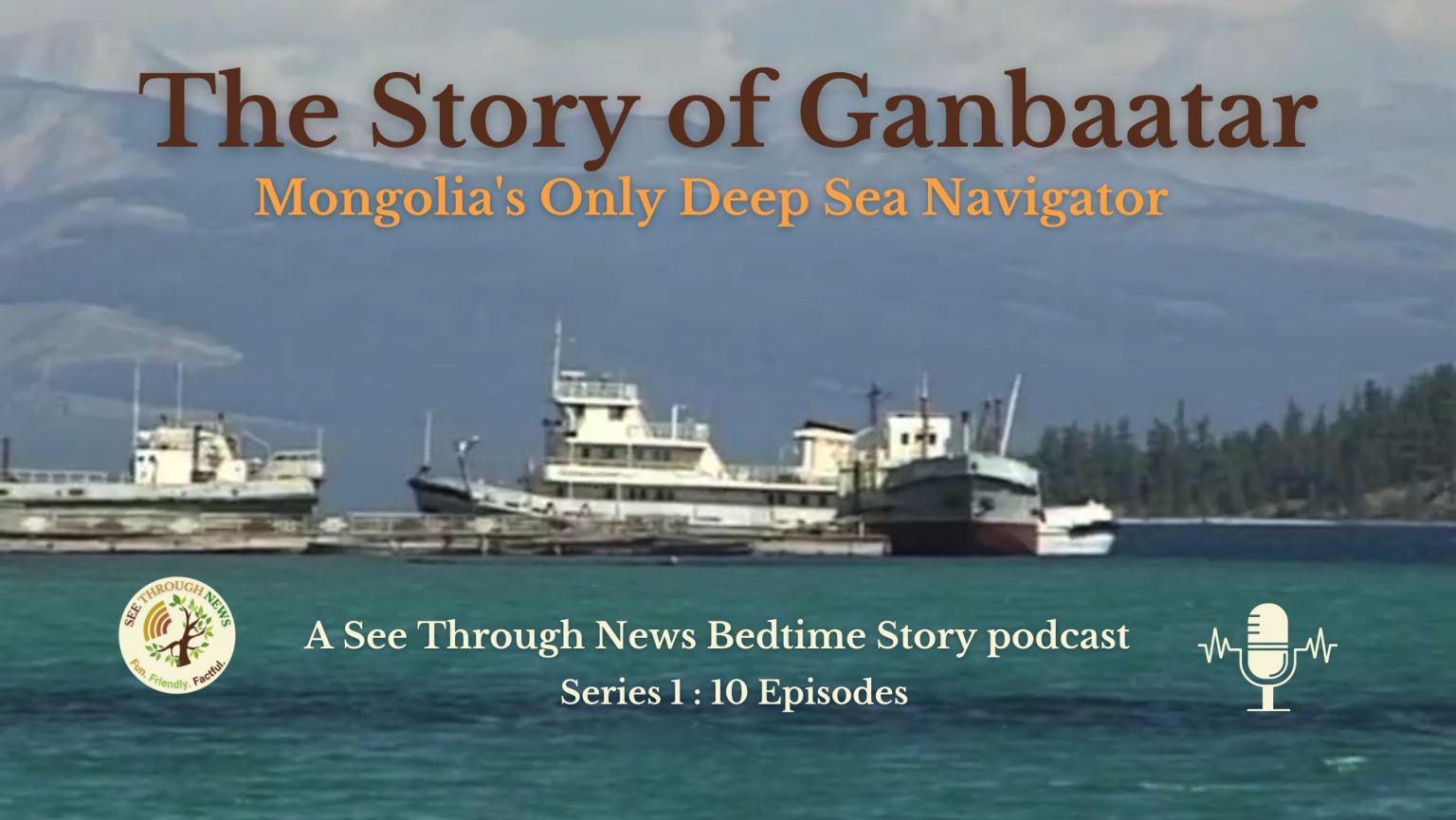Episode 3 of The Story of Ganbaatar: the only deep sea navigator in Mongolia, Series 1 of our ‘The Truth Lies in Bedtimes Stories from See Through News’ podcast
In Episode 3, we discover how, having made what he thought was a long journey from the lake at the very top of Mongolia to the national capitol, Ganbaatar’s unique journey began.
Music Notes:
The throat singing is from a recording of the Mandukhai Ensemble around 1992. It’s a traditional song called ‘Khuumii’.
Episode 1 – Fact, Fiction & Mongolia
Next: Episode 4 – The Paperwork
Written, Produced and Narrated by SternWriter
Audio production by Sam Wain
The Truth Lies in Bedtime Stories is a podcast from See Through News.
See Through News is a non-profit social media network with the Goal of Speeding Up Carbon Drawdown by Helping the Inactive Become Active.
Transcript
Episode 3: The Crisis Meeting
Not long after Ganbaatar had started working at the Ministry of Agriculture, his boss made the short journey from the ministry building to the Government Palace.
It was a five-minute walk, but he summoned the Ministerial vehicle, and instructed the driver to attach the flags to the front of the bonnet.
He was, after all, the Minister of Agriculture, the third-most important man in Mongolia, after the President and Vice-President.
Actually, he thought to himself, as he settled back into the leather upholstery of the Zil limousine, he was really the second-most powerful man in Mongolia.
By the time he arrived, the main chamber of the Government Palace was already packed. He took his seat on the dais, next to the President’s empty chair..
The President entered. Everyone stood and applauded. Then everyone except the President sat down again.
The chamber, packed with Mongolia’s most powerful leaders and wisest thinkers, fell silent. They all knew the reason for this crisis meeting, but no one knew the answer to their country’s problems.
The President wasted little time stating these problems. It had been hundreds of years since Chinggis Khan and his galloping warriors had dominated their entire continent, reaching the edge of Europe, and everyone knew how low their country had now sunk.
Mongolia, though still vast, was trapped, landlocked, between two giants. It seemed their only role in the world was as a superpower separator, keeping the Soviet Union and China apart. A buffer state. A No Man’s Land of nomads: isolated, ignored, abandoned.
Worse, the ‘zhud’ had come three years running – winters so severe they freeze livestock solid. Horses, camels, yaks, cattle, sheep, goats – all had perished in their hundreds, thousands, and millions.
Nomads without livestock become refugees, and the capital was now surrounded by a radiating spatter of ger, as desperate, destitute and starving Mongolians from across the nation sought help to survive.
The President asked if anyone had any ideas to solve their country’s crisis, and sat down.
The Minister of Agriculture felt he should stand up and say something, but he couldn’t think what. The silence grew.
Then, from the back of the hall. A hand was raised, and a reedy voice asked permission to speak.
Heads swivelled to the back of the hall, pens hovered above notepads. When Professor Dalai spoke, Mongolians listened.
Professor Dalai always had strange ideas, but was known for his vision, his ability to see what others cannot. Maybe that’s why his parents called him ‘Dalai’. It means ‘ocean’, and to landlocked Mongolians, the ocean represents all that’s distant, mysterious, mystical and magical.
The world beyond Mongolia’s borders fascinated Professor Dalai. Every day, books, newspapers and magazines in all sorts of foreign languages and scripts were delivered to his office at the University, next door to the Ministry of Agriculture.
Professor Dalai would be their only recipient in Mongolia. He devoured these foreign publications daily. If one of them contained the answer to their nation’s problems, there was only one person in Mongolia who’d know it.
Professor Dalai’s suggestion astonished everyone in the room.
‘Fish’, he said. ‘While our people starve, our rivers and lakes are full of food. Our land is blessed with rivers and lakes. If we learned how to raise fish, we would never go hungry.’
If you’ve never been to Mongolia, you wouldn’t know what a bizarre suggestion this was. Status, honour, wealth, and calories are all measured by the hoof. Livestock is Mongolia’s lifeblood, and meat and dairy, its diet.
Mongolians could see a point to growing vegetables – you could feed them to your cattle – but fish? Mongolians see fish like we see flowers – pretty enough, but not anything you’d consider putting in your mouth.
But this was a crisis, and no one had any other ideas.
Calling the meeting to a close, the President turned to the Minister of Agriculture, who immediately sat up straighter, and tried to look even more solemn.
‘Minister’, said the President. ‘Choose five of your brightest staff, and send them to Russia to learn the mysteries of fish farming’.
This, then, was how Ganbaatar’s fate was sealed, and his unique story set in motion.
Tease: In Part 4, The Paperwork, we’ll hear how Ganbaatar found himself studying in Russia, what he found himself studying, and why.

